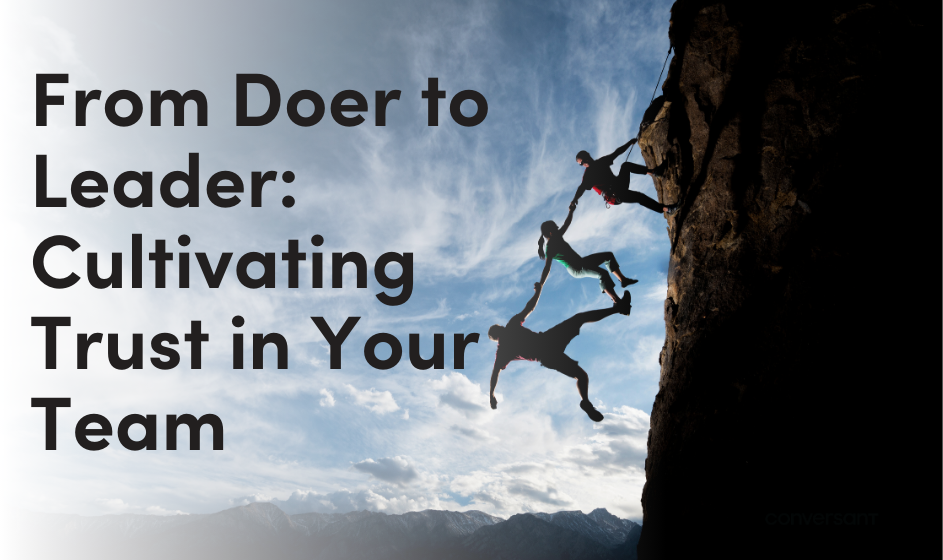In this episode, Mickey interviews a senior leader of Conversant, Jim Motroni, on his thoughts of why annual performance reviews might actually decrease performance. Leaders must learn to be partners for improvement. Learn more about how leaders influence the performance and wellbeing of other people. Working with humans can be unpredictable, but the outcomes are sure to be much more positive through open lines of communication between leaders and the people they work with.
Highlights
- The only people who should care about learning how to influence are people who have ever been responsible for others. So basically, everyone.
- Dominating in the moment may seem like the easiest possibility, but it means backward growth in the long run that impedes productive aims.
- The antidote to the misguided use power is connecting people from your own humanity and the humanity of the people around you.
- The fundamental role of leaders is to create self-supervising, committed people in action.
- Have conversations as soon as the need is apparent, because the longer you wait, the greater the risk of having an easier conversation turns into a more difficult—or even crisis—conversation.
- Seek to inspire open, frequent dialogue rather than avoid the difficult conversations.
- Instead of punitive assessment measures that may actually hinder growth and productivity, reviews can be an invitation to work in partnership toward collective improvement.
The Responsibility of Leaders to Influence
0:59 Mickey Connolly: Today I have with me one of our esteemed colleagues, James Joseph Motroni. Jim and I have known each other for 22 years. It was March of 1994, and in all that time I’ve known you, you’ve had a varied career including being a bank executive and then counsel to over 75 CEOs.
Jim is a senior leader here at Conversant, where we work on how the human interactions and big systems affect the quality of people’s lives and the results they produce.
1:56 Mickey: A particular area of interest for you is how leaders influence the performance of other people.
2:10 Jim Motroni: This idea is one of the first challenges I was introduced to when I was in a leadership role. I thought, “There has to be a secret formula for how this happens.”
A lot of what we do in business is anticipatable that yields to formula approaches and standard ways of doing things, but the challenge of working with human beings never really changes.
2:50 Jim: Since then, I’ve been a student of what it takes to create great results, but it is a never ending challenge to look at how this happens. I’m in that game from a personal and professional point of view.
3:23 Mickey: It’s interesting that we bring our families into the conversation, because the desire to influence the impact of others is also deeply embedded in the notion of parenting. The only people who should care about this are people who have ever been responsible for others.
When we have the responsibility for the wellbeing and performance of other people, we can take that on in ways that are constructive and ways that are destructive.
Human Connection as the Antidote to Corruption
4:05 Mickey: In our leaders, bosses and bastards trio of ways of being, leaders evoke contribution. They bring out the best in people and they help them operate at the top of their talents. Bosses issue instructions, which may or may not help someone operate. Bastards issue demands and provide no support whatsoever.
4:42 Jim: There’s something that encourages us to ignore what we know about how human beings coordinate and inspire each other. Something gets lost when we take on authority. When we have power over someone, we can act like the rules don’t apply to us.
Sometimes we forgot the basic principles of how humans get things done, inspire others, evoke the best in each other, create the kind of ongoing relationships that can handle increasingly difficult breakdowns.
5:21 Jim: Sometimes we rely on what looks to be the easy way out, which is to be a boss or a bastard. We may put up this veneer of, “I told you to do it, I dominated you or I had authority so I could make you do it.”
5:42 Jim: Those of us who have ever been parents or had parents will attest that sometimes that feels like the easiest way. But that’s one of those times when fast becomes slow. It actually moves us backwards in terms of our long-term ability to turn things out.
6:02 Jim: Leaders understand that they can use authority and power, but they use it judiciously and they use it inside of the desire to grow a relationship and evoke the best of what each person brings to the table.
6:26 Mickey: Jim is the co-author of The Vitality Imperative: How Connected Leaders and Their Teams Achieve More with Less Time, Money and Stress. You just reminded me of the Lord Acton quote that power corrupts and absolute power corrupts absolutely. The antidote to power is community—connecting people from their humanity and the humanity of others.
7:02 Mickey: Senior leaders can create development community around them, where people are free to give feedback, say what they see and report the impact the leader is having (whether it’s positive or negative).
If leaders promote an environment where leadership occurs in an open network of relationships and everyone has a right to give their view, that helps us maintain the humility that ought to come with the opportunity to be that influential in the lives of other people.
7:46 Jim: As we work inside of organizations that are attempting to manage that dynamic, part of the structure of how they manage it actually works against that sense of community you’re talking about. I’m referring to the challenge of having quarterly or annual performance reviews. There’s too much time between when we talk about how things are going.
8:17 Jim: One thing we talk about here at Conversant is how we can have conversations early and often that keep us at “Point Easy,” the time when it’s relatively easy to have a conversation to bring us back on track.
Community is built piece by piece with frequent interactions. If you try to build it on a quarterly or annual basis, it works against how humans operate.
8:46 Jim: Humans like to be at Point Easy, where small adjustments add up to big adjustments over a long term, and where talking about where we are frequently takes out the sting, fear and disconnection the times when we look to adjust performance.
9:00 Jim: This is adjusting performance and results in both directions: I want feedback from people who work with and for me and I want to give feedback to the people I work with and for. Building community sometimes flies in the face of the structures that we’ve set up in organizations that no longer scale or work for how we work anymore.
Inspiring Contribution through Autonomy and Transparency
9:27 Mickey: Over the years that you’ve counseled CEOs, it’s likely really frequent that leaders want to talk about the influence they have over others. What have you found over the years about how senior leaders can inspire the contribution of others and cause improvement without domination?
10:30 Jim: One is to have a sense of how I can connect a person to what our largest purposes are. There is an idea I reflect back on a lot that our colleague, Tom Knighton, introduced me to in a slightly different way:
The role of leaders fundamentally is to create self-supervising, committed people in action.
10:58 Jim: If create people that are self-supervising, they don’t need to keep coming back to us. If people are committed, they’re personally inspired and in the game so that when they run into a roadblock, they’re still disciplined and resilient enough to work through it. When they’re in action, people aren’t waiting to be told what to do.
11:22 Jim: If you look at that as a framework for how to create self-supervising, committed people in action, part of it is that they know what we’re trying to do as an organization so their efforts can move in that direction.
11:42 Jim: The second thing that leaders need to be able to do is to understand this unique individual in front of them and what inspires him or her and what support he or she needs to make this work.
12:00 Jim: The third thing is that leadership is a reciprocal arrangement. We are both getting smarter as we work together. I’m as interested in what you see that informs my leadership as I am with my capacity to tell you what to do.
12:20 Mickey: That’s an interesting triad to connect people to a purpose that’s important to the enterprise and one they can admire, to look at how their unique needs are and how that person can contribute to that purpose and to contribute to one another. That’s a pretty good recipe.
Open Conversation Rather Than Avoidance
12:24 Mickey: I’m going to look at the other side of the coin. Those are things to be for. I think there are also things to be against and I’d like to look at the relationship between them and see how they apply to each other.
12:59 Mickey: Our friend David Dotlich talks about a senior executive he knows, the CEO of a global corporation who could not bring himself to tell his executive assistant that his personal hygiene was so bad people didn’t want to be in meetings with him because of the smell, which had been going on for months.
13:29 Mickey: That story reminds me of how many things we see and don’t act on. You were talking about Point Easy earlier, and there are so many things we avoid.
13:43 Mickey: I was with some executives last week and I had to manage my own reactions. There is part of their company that is not going well relative to their strategic commitments and the people who can make the difference don’t have all the facts. They don’t want to “be negative.”
Senior executives saying, “Well, we could just hurt everyone’s motivation.” Okay, so keep everyone feeling good while the place goes bankrupt…
14:14 Jim: “We’ll be the happiest people in the unemployment line.”
14:18 Mickey: It’s amazing how many people who are sophisticated and successful enough to get into these senior leadership positions who then shrink away from actually having open conversations with people.
14:34 Mickey: What do you say to these senior executives who seem to be otherwise competent but are afraid to actually give their people complete awareness of what is going on around them that might affect their ability to contribute?
15:30 Jim: Part of what these executives are holding as a false equivalent is that the pain of having the conversation is the flip side of the gain we have short and long term. There’s confronting that falsity. And also asking, “How do I have a conversation with this person that forwards what they care about and what we all care about together?”
16:18 Jim: That’s a different question than, “How do I give them some feedback that only hurts them in the smallest way possible?” That’s preparing for a different conversation than:
“How do I give them the feedback they need to be effective in their job and satisfied in a way that has them be appreciative of the risk I took and the amount of information they get?”
16:58 Jim: It’s a more sophisticated understanding of the leader’s role than just, “My job is to do the best I can to avoid all possibility of having to stand up to fear.” No, fear and the challenges of it are the natural outgrowth of the position you’re in.
17:15 Jim: Not everyone is up for the level of leadership they’re being asked for. People aren’t always confronting what it’s really going to take to be a leader. It has them shrink from the opportunity that’s in front of them.
17:37 Mickey: One of the things we’ve seen in the nearly thirty years we’ve been looking at how leaders produce the most results per unit of time, money and stress, there are many people who get in positions of leadership and then shrink from the challenges that come with that position.
18:03 Mickey: One of the challenges of being a leader is your job is to get people connected to reality and give them the information they need to know how they’re doing relative to their own desire to make a difference. And then, provide an environment where they have access to all of the people and resources they need to improve.
Moving from Formal Review to Frequent Conversation
18:24 Mickey: These are really important, informal conversational skills you were referring to. You can be with someone, can understand they’re frightened and disappointed because the results aren’t good.
You can connect with someone on what is deeply important to them and help them recover their whole self, not just the scared part.
18:51 Mickey: There are some skills there. You mentioned earlier the issue about formal reviews and there are some companies doing some experiments to move away from these mid-year and end-of-year formal reviews. They’re now betting the everyday conversations are the leverage point for performance improvement.
There was a study we used some years ago that showed formal performance conversations actually decreased performance.
19:32 Mickey: What is it about the formal conversations that doesn’t improve performance and what do you think is crucial for leaders if we’re going to move to this reliance on informal discussion to make a difference in the success of our organizations?
19:51 Jim: The structure that is used for a lot of these conversations actually prevent the conversations from happening.
The idea is fill out this form, mark these numbers and somehow handing people the paperwork that’s headed to HR is the review and will cause the change you want. That’s nonsensical.
20:27 Jim: The preparation is great as a starting point for conversations; they are not the conversation. For people to move from annual or quarterly to way more frequent, highly leveraged conversations and discussions, it means a shift in how the conversation takes place so it really is more of a dialogue. It doesn’t depend on written sheets or checking boxes.
21:05 Jim: The second thing is to treat a review as a discussion. It goes both directions. What do you see that I don’t see? Where do I have points of view that I’m interested in getting informed and educated?
How can I help shape what I see you doing as a person who works for me in a way that evokes and invites more of what you want to be excited about?
Leadership as Partnership
21:30 Mickey: The formal environment creates this spirit of assessment, where you are now called into the principal’s office to be told if you are good or bad from someone who sits on high and can tell the difference.
21:50 Mickey: The reality of doing great work is we’re in it together. The way you’re speaking, it’s we are partners in improvement. Our best day is still to come, not behind us. We need each other because together we see things we can’t see by ourselves.
22:13 Mickey: That spirit you have of someone in a senior executive position an open partnership of improvement that allows all parties to contribute to one another is an act of leadership.
22:30 Mickey: The boss just fills in the forms the way you were talking about. The bastard is just annoyed and wants better people.
22:40 Jim: That’s right. “How did I get stuck with all these losers?!”
22:44 Mickey: “It’s amazing. There were a lot of these at my last company too; they must follow me.” The bastards don’t realize what they are actually procreating.
23:02 Jim: That kind of conversation doesn’t preclude the importance of corrective conversations. It’s not all a “Kumbaya” moment.
23:11 Mickey: Absolutely not. I’ve seen so many leaders do a terrific job of bringing up very difficult issues but they bring them up in the context of a purpose all parties care about, and being there to help the person make a bigger difference in they’re currently making.
23:57 Jim: Where it’s necessary, bad news doesn’t get better over time. What is important for leaders is to recognize that every day they delay moves them from Point Easy to Point Difficult to Point Crisis.
24:18 Jim: How can I engage in the conversation without having to know how it’s going to turn out and without having a clear sense of how I’m going to make difficult conversations easy. Sometimes difficult conversations are just difficult.
My strong encouragement is having tough conversations is rarely as bad as we think it’s going to be, but I can almost guarantee you, not having them pushes it to a time that makes it even harder to have an outcome we can all be proud of.



